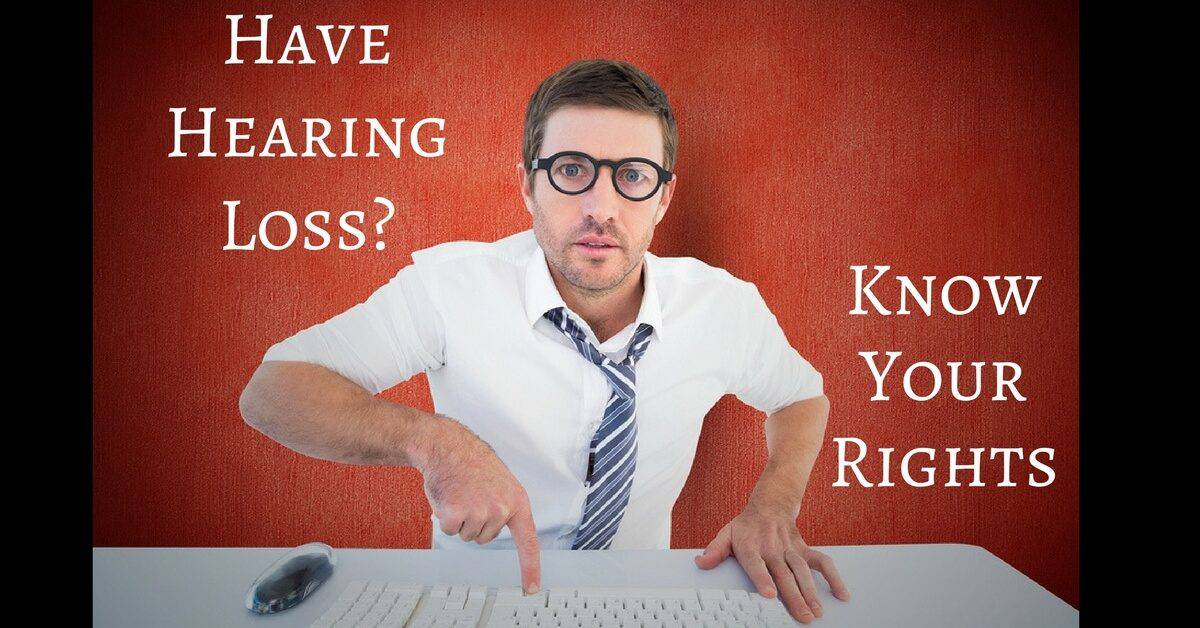If you have hearing loss, you know that sometimes the world throws you a curveball. It can seem like entire systems are operating without respect or regard for people with hearing impairments. The hearing world can often feel exclusionary and out-of-reach.
Working against the exclusion of the hearing impaired, advocates for the rights of people with disabilities has fought for decades to make the world more inclusive and accessible. From major legislation, like the Americans with Disabilities Act (the ADA) to pushing local legislation and implementation of accessible resources, activists for hearing loss. If you’re not acquainted with your rights as a hearing disabled person, you can check out a great overview at the Hearing Loss Association of America’s website.
The Americans with Disabilities Act
When the ADA was set into law, it represented a major sweeping victory for disability access. The ADA defines protections for disabled people in four major categories: fair employment, fair government services, fair access to businesses and public spaces and fair access to telecommunications.
While there’s enough in each section of the ADA to warrant its own posting, here’s a rundown of some of the key points:
Fair Employment – This section applies to employers with 15 or more employees and protects employees against disability-based discrimination. Fair employment for persons with hearing loss also means employers must be able to make information accessible to employees with hearing impairment including meetings, negotiations and decision-making. Finally, this portion of the ADA makes it illegal to fire and employee if they file an ADA-related complaint against the employer.
Fair Government Services – Government services can include public libraries, schools, hospitals, and courts in addition to government operations and social services. The ADA requires that accommodations must be made effectively communicate with the hearing impaired and deliver information. This portion covers government services on all levels from local to federal so those with disabilities can receive the same consideration, time and communication as the hearing.
Fair Access – The ADA also regulates ways in which businesses must provide for people with hearing impairment. Fair access to businesses applies to businesses no matter how large or small they may be. It regulates access to stores and services that include accommodations to be made for people with hearing impairments. Movie theaters, concert halls and churches are all encouraged to have closed captioning or telecoil services available. Lodging like hotels and resorts must be able to provide alarm and alert systems that are not sound-based.
Fair Telecommunications – The telecommunication regulations of the ADA setup free-of-charge and other communication tools that can be integrated into our large communication networks. Free relay services such as TTY phones and Video Relay Service can give deaf and hearing-impaired people adaptive communication tools to have equal participation in national (and international) networks.
Fair Housing Act
Outside of the ADA, legislation exists to insure and expand the protections for people with disabilities. The Fair Housing Act works to create anti-discriminatory policies in housing. As a person with hearing loss, housing providers are required to make accommodations for clear communication, and you are able to make adjustments and modifications to your housing that facilitate your hearing ability.
Air Carrier Access Act
The ACAA provides persons with disabilities guaranteed rights when they fly. According to the ACAA both domestic and foreign airlines must adhere to a non-discrimination policy for persons with disabilities. Additionally, airlines must have available accommodations for disabled passengers, including reservation services and in-airport services.
Hearing Aid Compatibility Act
The Hearing Aid Compatibility Act works with the FCC to make sure that telephones in the united states do not cause interference distortion or disruption in hearing aid signals. This applied especially to wireless phone manufacturers whose devices caused frequent disruption of hearing aid signals.
My Hearing Centers
If you have concerns with your hearing or want to learn more about your hearing device, contact us today at My Hearing Center. Our hearing specialists offer you superior personalized care and the widest selection of quality hearing solutions. When you set up a check-up and exam with My Hearing Centers you begin your journey to hearing wellness, and we’re here to give you the care your hearing deserves.


